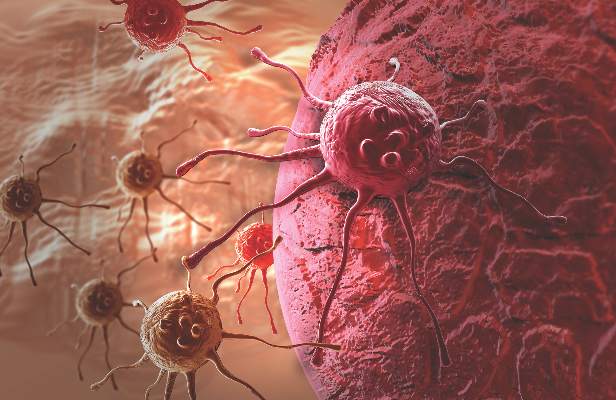User login
Cetuximab monotherapy had no activity in patients with metastatic colorectal cancer (mCRC) and KRAS G13D mutations, a finding that contradicts the theory that the G13D mutation differs from other RAS mutations and confers EGFR-1 monoclonal antibody sensitivity.
None of the patients who received cetuximab monotherapy had a response, and the 6-month progression-free survival rate was 10%.
Combined with recent similar reports of cetuximab monotherapy in G13D-mutated mCRC, the findings, “definitively exclude a clinical rationale for treating patients who have G13D-mutant CRC with single-agent cetuximab. It is reasonable to extrapolate this to an EGFR-I monoclonal antibody class effect, given the retrospective panitumumab data that also failed to show benefit in the G13D cohort, together with the head-to-head comparison of EGFR-I monoclonal antibodies showing no substantive differences between cetuximab and panitumumab in the refractory setting,” wrote Dr. Eva Segelov of University of New South Wales, Australia, and colleagues (J Clin Oncol. 2016 Apr 25. doi: 10.1200/JCO.2015.65.6843).
As part of the ICECREAM (Irinotecan Cetuximab Evaluation and Cetuximab Response Evaluation Among Patients with a G13D Mutation) prospective trial, the analysis included 51 patients with chemotherapy-refractory mCRC and KRAS G13D mutation; 25 received cetuximab monotherapy and 26 received cetuximab plus irinotecan.
In the cetuximab plus irinotecan arm, partial responses were observed in two patients (9%) and the 6-month PFS was 23%. Although both patients with partial responses had irinotecan-free periods of more than 12 months, in general, the time since previous irinotecan treatment did not seem to influence the response to combination therapy. The investigators noted the growing interest in retreating patients with previous chemotherapy and targeted agents, potentially aided by ultrasensitive liquid-biopsy measurements of resistant subclones, “which seem to wax and wane with drug exposure and treatment breaks,” they wrote.
To help discern whether the combination therapy has true synergy or there is an irinotecan rechallenge effect, additional data from the wild-type cohort of the ICECREAM study is awaited.
In addition to similar 6-month PFS in the cetuximab monotherapy and cetuximab plus irinotecan arms, no significant difference in overall survival was observed between the two arms (6-month survival, 56% vs. 42%; HR, 0.95; 95% CI, 0.53-1.68).
Dr. Segelov reported having financial ties to Roche, Bayer Pharmaceuticals Australia, Ipsen, Pfizer, and Merck Serono. Several of her coauthors reported ties to industry sources.
Cetuximab monotherapy had no activity in patients with metastatic colorectal cancer (mCRC) and KRAS G13D mutations, a finding that contradicts the theory that the G13D mutation differs from other RAS mutations and confers EGFR-1 monoclonal antibody sensitivity.
None of the patients who received cetuximab monotherapy had a response, and the 6-month progression-free survival rate was 10%.
Combined with recent similar reports of cetuximab monotherapy in G13D-mutated mCRC, the findings, “definitively exclude a clinical rationale for treating patients who have G13D-mutant CRC with single-agent cetuximab. It is reasonable to extrapolate this to an EGFR-I monoclonal antibody class effect, given the retrospective panitumumab data that also failed to show benefit in the G13D cohort, together with the head-to-head comparison of EGFR-I monoclonal antibodies showing no substantive differences between cetuximab and panitumumab in the refractory setting,” wrote Dr. Eva Segelov of University of New South Wales, Australia, and colleagues (J Clin Oncol. 2016 Apr 25. doi: 10.1200/JCO.2015.65.6843).
As part of the ICECREAM (Irinotecan Cetuximab Evaluation and Cetuximab Response Evaluation Among Patients with a G13D Mutation) prospective trial, the analysis included 51 patients with chemotherapy-refractory mCRC and KRAS G13D mutation; 25 received cetuximab monotherapy and 26 received cetuximab plus irinotecan.
In the cetuximab plus irinotecan arm, partial responses were observed in two patients (9%) and the 6-month PFS was 23%. Although both patients with partial responses had irinotecan-free periods of more than 12 months, in general, the time since previous irinotecan treatment did not seem to influence the response to combination therapy. The investigators noted the growing interest in retreating patients with previous chemotherapy and targeted agents, potentially aided by ultrasensitive liquid-biopsy measurements of resistant subclones, “which seem to wax and wane with drug exposure and treatment breaks,” they wrote.
To help discern whether the combination therapy has true synergy or there is an irinotecan rechallenge effect, additional data from the wild-type cohort of the ICECREAM study is awaited.
In addition to similar 6-month PFS in the cetuximab monotherapy and cetuximab plus irinotecan arms, no significant difference in overall survival was observed between the two arms (6-month survival, 56% vs. 42%; HR, 0.95; 95% CI, 0.53-1.68).
Dr. Segelov reported having financial ties to Roche, Bayer Pharmaceuticals Australia, Ipsen, Pfizer, and Merck Serono. Several of her coauthors reported ties to industry sources.
Cetuximab monotherapy had no activity in patients with metastatic colorectal cancer (mCRC) and KRAS G13D mutations, a finding that contradicts the theory that the G13D mutation differs from other RAS mutations and confers EGFR-1 monoclonal antibody sensitivity.
None of the patients who received cetuximab monotherapy had a response, and the 6-month progression-free survival rate was 10%.
Combined with recent similar reports of cetuximab monotherapy in G13D-mutated mCRC, the findings, “definitively exclude a clinical rationale for treating patients who have G13D-mutant CRC with single-agent cetuximab. It is reasonable to extrapolate this to an EGFR-I monoclonal antibody class effect, given the retrospective panitumumab data that also failed to show benefit in the G13D cohort, together with the head-to-head comparison of EGFR-I monoclonal antibodies showing no substantive differences between cetuximab and panitumumab in the refractory setting,” wrote Dr. Eva Segelov of University of New South Wales, Australia, and colleagues (J Clin Oncol. 2016 Apr 25. doi: 10.1200/JCO.2015.65.6843).
As part of the ICECREAM (Irinotecan Cetuximab Evaluation and Cetuximab Response Evaluation Among Patients with a G13D Mutation) prospective trial, the analysis included 51 patients with chemotherapy-refractory mCRC and KRAS G13D mutation; 25 received cetuximab monotherapy and 26 received cetuximab plus irinotecan.
In the cetuximab plus irinotecan arm, partial responses were observed in two patients (9%) and the 6-month PFS was 23%. Although both patients with partial responses had irinotecan-free periods of more than 12 months, in general, the time since previous irinotecan treatment did not seem to influence the response to combination therapy. The investigators noted the growing interest in retreating patients with previous chemotherapy and targeted agents, potentially aided by ultrasensitive liquid-biopsy measurements of resistant subclones, “which seem to wax and wane with drug exposure and treatment breaks,” they wrote.
To help discern whether the combination therapy has true synergy or there is an irinotecan rechallenge effect, additional data from the wild-type cohort of the ICECREAM study is awaited.
In addition to similar 6-month PFS in the cetuximab monotherapy and cetuximab plus irinotecan arms, no significant difference in overall survival was observed between the two arms (6-month survival, 56% vs. 42%; HR, 0.95; 95% CI, 0.53-1.68).
Dr. Segelov reported having financial ties to Roche, Bayer Pharmaceuticals Australia, Ipsen, Pfizer, and Merck Serono. Several of her coauthors reported ties to industry sources.
FROM JOURNAL OF CLINICAL ONCOLOGY
Key clinical point: In patients with metastatic colorectal cancer and KRAS G13D mutation, cetuximab monotherapy showed no activity, and cetuximab plus irinotecan showed modest activity.
Major finding: In the cetuximab arm, 6-month progression-free survival (PFS) was 10% with a 0% response rate; in the cetuximab plus irinotecan arm, 6-month PFS was 23% with a 9% partial response rate.
Data sources: As part of the ICECREAM prospective trial, the analysis included 51 patients with chemotherapy-refractory mCRC and KRAS G13D mutation; 25 received cetuximab monotherapy and 26 received cetuximab plus irinotecan.
Disclosures: Dr. Segelov reported having financial ties to Roche, Bayer Pharmaceuticals Australia, Ipsen, Pfizer, and Merck Serono. Several of her coauthors reported ties to industry sources.

